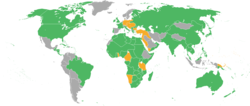World War I Allies
| Allies of World War I | ||||||||
| Military alliance | ||||||||
|
||||||||
|
||||||||
| Capital | Not specified | |||||||
| Political structure | Military alliance | |||||||
| Historical era | World War I | |||||||
| • | Established | 1914 | ||||||
| • | Disestablished | 1918 | ||||||
|
||||||||
The Allies of World War I were the countries that opposed the Central Powers in the First World War.
The members of the original Triple Entente of 1907 were the French Republic, the British Empire and the Russian Empire. Italy ended its alliance with the Central Powers, arguing that Germany and Austria-Hungary started the war and that the alliance was only defensive in nature; it entered the war on the side of the Entente in 1915. Japan was another important member. Belgium, Serbia, Greece, Montenegro, and Romania were affiliated members of the Entente.
The 1920 Treaty of Sèvres defines the Principal Allied Powers as the British Empire, French Republic, Italy and Japan. The Allied Powers comprised, together with the Principal Allied Powers, Armenia, Belgium, Greece, Hejaz, Poland, Portugal, Romania, Serb-Croat-Slovene state and Czechoslovakia.
The U.S. declaration of war on Germany, on 6 April 1917 was on the grounds that Germany had violated its neutrality by attacking international shipping and the Zimmermann Telegram sent to Mexico. It declared war on Austria-Hungary in December 1917. The U.S. entered the war as an "associated power", rather than as a formal ally of France and the United Kingdom, in order to avoid "foreign entanglements". Although the Ottoman Empire and Bulgaria severed relations with the United States, neither declared war.
...
Wikipedia

